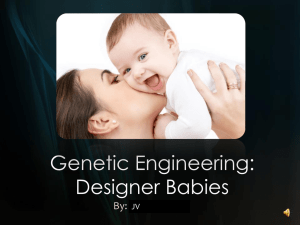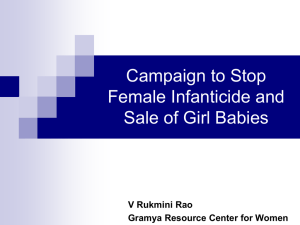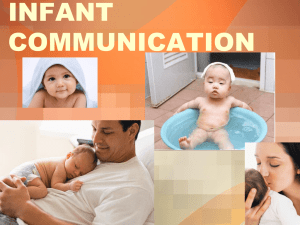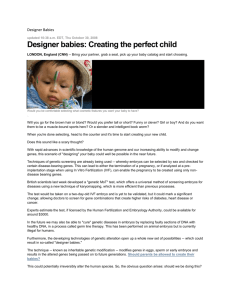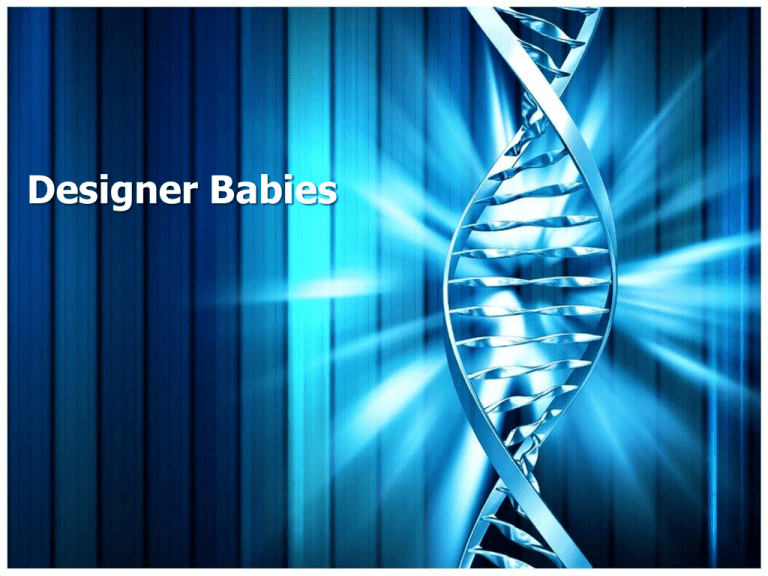
Designer Babies
Designer Babies
• The term designer babies has been used to describe offspring from
parents who can select traits such as looks, eye color and intelligence in
their offspring.
History of Designer Babies
• Designer babies was thought of by a guy named Dr Jeff
Steinberg, a pioneer of IVF in the 1970s
• Long before Watson and Crick famously uncovered the
structure of DNA in 1953.
• In 1928 a scientist named Frederick Griffith was working
on a project that enabled others to point out that DNA
was the molecule of inheritance.
• Fourteen years later a scientist named Oswald Avery
continued with Griffith’s experiment to see what the
inheritance molecule was. In this experiment he
destroyed the lipids, ribonucleic acids, carbohydrates,
and proteins of the virulent pneumonia.
• In the mid-1990s, embryologist Jacques Cohen pioneered
a promising new technique for helping infertile women
have children. His technique, known as cytoplasmic
transfer, was intended to "rescue" the eggs of infertile
women who had undergone repeated.
•
•
•
•
•
Five benefits from designer babies that we can achieve is that in the future we
may also be able to "cure" genetic diseases in embryos by replacing faulty
sections of DNA with healthy DNA, in a process called germ line therapy.
The second benefit we can achieve from designer baby is that you can change
you babies mental characteristics such as IQ, personality, habit to whatever
pleases you.
The third benefit is genetic screening that can lessen the chances of your baby
having severe diseases like down syndrome, famial hypercholesterolemia, and
horrible blood disorders.
The fourth example is that In the year 2003, a couple in the UK gave birth to a
genetically designed baby boy, whose stem cells from the umbilical cord would
be used to treat a blood disorder in his older brother, that was potentially life
threatening.
The fifth benefit is that in 2005 scientists were given approval to carry out
experiments that could, within a few years lead to the first genetically altered
babies being born in Britain. The controversial decision to approve this radical
form of gene transplant would be the first realistic hope of an effective
treatment for an entire class of serious genetic diseases.
•
•
•
•
•
There are five negative things we can get from designer babies. For example take
the case of Cindy and John Whitley. Their first child died at the age of 9 months
from a deadly genetic disorder called spinal muscular atrophy.
The second example is that your baby might come cut with a disorder or
malfunction.
The third example is that this technology is very expensive and normal people
would not be able to afford it.
The fourth benefit is that designer babies will help to prevent a rich-poor divide
and a superior race from emerging, where those who have been genetically
engineered to contain superior genes all come from rich or powerful families.
The last example is that there are some 200 genetic disorders which may be
detected at the egg-cell stage. Couples with a genetic history of diseases such as
Tay-Sachs disease or Huntington’s disease may choose to detect these diseases at
the embryo stage rather than risk an elective abortion at a later stage.
1.
2.
3.
4.
5.
There are many different ways designer babies are used, one of the
ways is that its used by a Los Angeles clinic that states that it will soon
help couples select both gender and physical traits in a baby when they
undergo a form of fertility treatment.
The second way it is used is by pre-implantation genetic diagnosis that
has been long used for the medical purpose of averting life-threatening
diseases in children, the science behind it has quietly progressed to the
point that it could potentially be used to create designer babies.
Throughout the past decade, scientists have made large progress in
identifying various genetic sequences. Increased ability to determine
which genes decide which characteristics.
Although there are many grey areas, we feel that if regulated correctly,
it is the best solution that can effectively prevent the exploitation of
this technology and at the same time, create a new generation of
healthier children.
We have chosen this solution because it is beneficial to more than half
of the identified stakeholders, namely the babies, the parents and the
government.
1) The future of designer babies is that there’s is a recent scientists that
have made rapid advances in our knowledge, In the future we may be
able to "cure" genetic diseases in embryos by replacing faulty sections
of DNA with healthy DNA
2) Advanced reproductive techniques involve using InVitro Fertilisation or
IVF to fertilize eggs with sperm in 'test-tubes' outside the mother's
body in a laboratory.
3) The third way its used is by In the not too distant future parents will
have the chance to customize their unborn baby any way they see fit,
everything from immunity to certain diseases to picking the color of
their hair will be offered for the ultimate 'designer baby'.
4) Genetic scientists believe, in the next few decades, we might be able to
design our future babies—to choose the features we want our children
to have even before they are born.
5) In addition, we might be able to have our unborn child’s genes tested to
detect any genetic disorders and have doctors modify a defective gene
or even replace it to make sure our child is born disease-free.
•
•
•
•
•
Some ethical issues of designer babies is that it would be the long term effects of
such designer babies and if they are entirely safe.
Another issue is that what if the child turns out to have brown eyes and black
hair and the parents ordered a blonde, blue-eyed tot? If this sounds like an offthe-wall scenario, consider the fact that some unsatisfied parents have actually
taken legal action to protest their so-called “defective” children.
The third issues is that there are some 200 genetic disorders which may be
detected at the egg-cell stage. Couples with a genetic history of diseases such as
Tay-Sachs disease or Huntington’s disease may choose to detect these diseases at
the embryo stage rather than risk an elective abortion at a later stage.
The fourth ethical problem can be dismissed at once is the worry that the new
baby will be subject to hurtful medical procedures.
The fifth problem is that the technology (pre-implantation genetic diagnosis or
PGD) used for making a designer baby is very expensive and not a lot of people
can afford it.
• Treatment cost in U.S. Clinics :US$ 19kWhen the world is concerned over
gender balance, the patients claim that it is to bring gender balance of
their family." Thousands of couples flocking to U.S. to cash in on the
disputed luxury of being able to dictate the sex of their nest baby.
Parents from around the world including India are forking out around
$19000 for a groundbreaking gender selection treatment offered by only
a handful of U.S. clinics but banned in most countries.
• My opinion on designer babies is that it is so cool that we have enough
technology that we can choose the babies DNA on how it looks, how
smart it is, and what its interests are. I agree that the advances in
technology and science can be wonderful. For example, helping parents
have healthy children without birth defects or any diseases is pretty
cool.. However, allowing wealthy adults to be able to create their own
robots or monster is not fair to the child! It's not up to the parents to
literally force their decision on what another human being should be
like. They should at least not make any changes on how the baby looks.
Another opinion is that the scientist are not prepared they can create a
new disease by tampering the DNA that can wipe out human kind like in
the movie I AM LEGEND played by Will Smith….
Bibliography
• www.telegraph.co.uk/news/uknews/1559112/A-green-light-fordesginer-babies.html
• http://new.bbc.co-uk/2/health/7918296.stm
• http://library.thinkquest.org/20830/textbook/historyofDNAreasearch.ht
ml
• www.washingtonmonthly.com/features/2001/0203.brownlee.html
• http://singularityhub.com/2009/02/25/designer-babies
• http://designerbabies-jtcc.blogspot.com/
• http://www.buzzle.com/articles/designer-babies-ethical-issues.html
• http://www.readersdigest.ca/mag/2001/09/designer_babies.html
• http://infoproc.blogspot.com/2009/02/designer-babies.html
• http://www.jesus-issavior.com/End%20of%20the%20World/Genetics%20Nightmare/designe
r_babies.html
• http://www.bionetonline.org/english/content/db_cont1.htm





